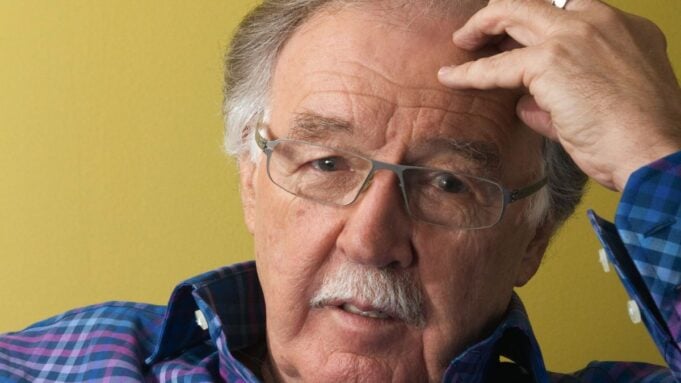Legendary Australian journalist, author, and broadcaster George Negus has died at the age of 82 following a battle with Alzheimer’s disease, his family confirmed on October 15th.
Negus, whose fearless reporting style and ability to bring global affairs into Australian homes made him a household name, passed away peacefully surrounded by loved ones.
“Today, our incredible father and partner George passed away peacefully surrounded by loved ones after a gracious decline from Alzheimer’s disease, all the while with his trademark smile,” the family wrote in a statement.
“Despite the challenges diseases like Alzheimer’s inflict on families, we still shared beautiful times, laughter and happiness together in recent times. We also learnt a lot.”
“And obviously, a huge part of our learning curve was aided by Australia’s healthcare workers. So to them, we say: ‘Thank you for doing your jobs – we have so much to thank you all for as we have striven to support George in the best possible way’.”
They continued “George told us endlessly that he never imagined having a family, so the part of his life we shared was everything to him, and always his priority.”
The Walkley Award-winning reporter was diagnosed with Alzheimer’s in 2022, and last month, his son Ned posted on LinkedIn, revealing the toll the disease had taken. “Today is Father’s Day in Australia and we had a walk on the beach together … He was clearly not sure why this particular walk was symbolic and sometimes not sure with whom he was walking,” Ned wrote.
Negus’s storied career spanned over five decades, beginning with his groundbreaking role as one of the founding presenters of “60 Minutes” in 1979, alongside Ian Leslie and Ray Martin. His no-nonsense approach made him one of the most memorable faces on Australian television.
His interview with British Prime Minister Margaret Thatcher in 1981, in which he famously asked, “Why are people in the street telling us that Margaret Thatcher isn’t just inflexible, not just single-minded, sometimes just plain pigheaded and won’t be told by anybody?”, became one of the most iconic moments in Australian journalism.
My favourite George Negus interview.
In 1982, he asked Margaret Thatcher “Why do people stop us in the street and tell us Margaret Thatcher is pig-headed?”
She did not like the blunt question 😂😂😂pic.twitter.com/Xdus9vyLYU
— JON DEE (JonDee.com) (@JonDeeOz) October 15, 2024
Reflecting on their time together on “60 Minutes”, Ray Martin paid tribute, calling Negus “the strongest TV character I can remember.”
“He was more than a colleague. He was a mate. A very good mate. I think that Logie created television for George Negus. I mean, he was probably the strongest TV character I can remember, on Australian television at least. He was outrageous. He was charismatic. He was loud. He was heavily opinionated. He was funny. But he was just a great bloke.”
Channel 10 icon Sandra Sully described him as a “beloved veteran of the game”. “[He] defined the term foreign correspondent. Importantly though he was fearless and funny, now sorely missed,” she wrote.
Dementia Australia also released a statement that Negus had “generously contributed to raising awareness about dementia” prior to his death, with chief executive Professor Tanya Buchanan, saying that Negus and his family ensured “all Australians impacted by dementia know they are not alone”.
After his time on “60 Minutes,” Negus continued his influence on Australian journalism as the founding host of the ABC’s “Foreign Correspondent” from 1992 to 1999, his ability to simplify complex global issues to everyday Aussies, made him a viewer favourite.
Negus’s career was not just limited to television. He authored several books, including The World From Islam, which explored the diversity of the Muslim world and offered unique perspectives on global issues. He was also a staunch advocate for the environment and served on the board of Soccer Australia.
In recognition of his contributions, Negus was appointed a Member of the Order of Australia (AM) in 2015. In 2021, his remarkable career was further acknowledged when he received the Walkley Award for Most Outstanding Contribution to Journalism.
Negus is survived by his wife, fellow journalist Kirsty Cockburn, and their sons, Serge and Ned. In their statement, his family beautifully captured his personal legacy: “Many of you will have uplifting and distinct memories of him, regardless of whether you met him, but especially if you did.
“If you are looking to connect with those memories here are a few suggestions from us; kick a football, enjoy a hearty bowl of pasta, plan your next adventure to somewhere intriguing, or ask a curious question you think needs answering (and as he would say, the most important and simple one, ‘Why?).”
“Even better, do all of those things and do them together with people you love. That’s what he would have done.”
“To us, ‘Negsy’ was the greatest father, grandfather, and partner there ever was. We created a beautiful life together and we will miss him dearly.”
Prime Minister Anthony Albanese called the reporter “a giant of Australian journalism.” He added, “George sought and served the truth with steely determination and a twinkle in his eye, and along the way, he made even the smallest TV screen feel that much bigger.”
Negus’s passing marks the end of an era in Australian journalism, but his legacy of fearless reporting and intellectual curiosity will continue to inspire future generations of journalists.































